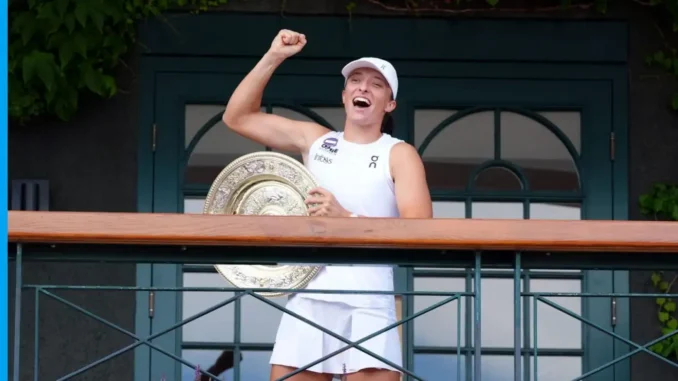
On a blazing July afternoon in 2025, Iga Swiatek stood on Wimbledon’s Centre Court, clutching the Venus Rosewater Dish after a breathtaking 6-0, 6-0 demolition of Amanda Anisimova in the women’s singles final. The 24-year-old Pole, once the world’s top-ranked player, delivered a performance of ruthless precision, marking her first Wimbledon title and sixth Grand Slam triumph. Yet, beyond the historic double-bagel victory—the first in a Wimbledon women’s final since 1911—Swiatek used her moment in the spotlight to deliver a pointed message to her critics, particularly the Polish media, pleading, “I hope they will just leave me alone and let me do my job.” Her words, raw and resolute, reflected a year of adversity and a champion’s resolve to reclaim her narrative.
Swiatek’s journey to this Wimbledon glory was anything but straightforward. The past year had tested her mettle, with a one-month doping ban in late 2024—caused by a contaminated sleep medication—casting a shadow over her reputation. The ordeal, coupled with a dip in form, saw her slip to No. 8 in the rankings after failing to defend her French Open title for the first time since 2021. The Polish media, known for its unrelenting scrutiny, dissected her every move, from her coaching changes to her on-court struggles. “For sure, the past months, how the media sometimes described me – and I’ve got to say, unfortunately, Polish media – how they treated me and my team, it wasn’t really pleasant,” Swiatek said in her post-match press conference. Her frustration was palpable, as she highlighted the toll of constant criticism: “We as public people and as athletes, we can’t really react to everything what’s going on. We’ve got to focus on ourselves.”
The 2025 season had been a crucible for Swiatek. After a tearful semifinal loss at the Paris Olympics and a third-round exit at Wimbledon the previous year, where she admitted her “tank of really pushing myself to the limits became suddenly, like, empty,” doubts swirled about her dominance. Her decision to part ways with coach Tomasz Wiktorowski and team up with Wim Fissette in October 2024 drew further scrutiny, with many questioning whether she could adapt her clay-court mastery to grass. Yet, Swiatek silenced those doubts with a transformative grass-court campaign. A runner-up finish at Bad Homburg just before Wimbledon signaled a resurgence, and her Wimbledon run—defeating Polina Kudermetova, Caty McNally, Danielle Collins, Clara Tauson, Liudmila Samsonova, and Belinda Bencic—showcased a newfound ease. “I want to thank my coach who joined this year. With ups and downs, right now we showed everybody that it’s working,” she said, crediting Fissette for helping her find “a new freshness” on grass.
The final against Anisimova was a masterclass in control and aggression. In just 57 minutes, Swiatek overwhelmed her opponent, winning 100% of her first-serve points and committing only five unforced errors. Anisimova, shell-shocked, admitted, “I don’t really know what was going on with my serve,” having won just 26% of her first-serve points. Swiatek, however, remained gracious, saying, “I want to congratulate Amanda for an amazing two weeks, no matter what happened today.” The victory marked Swiatek’s 100th Grand Slam match win and made her the third woman in the Open Era, after Margaret Court and Monica Seles, to win her first six major finals. “I didn’t even dream, because it felt too far,” she confessed, reflecting on a title she once thought unattainable. “I’m really happy with the whole process, how it looked like from the first day we stepped on a grass court.”
Beyond the trophy, presented by the Princess of Wales—an experience Swiatek called “surreal” as a lifelong royal family fan—the win was a personal triumph. “I hope I proved to everybody that they should just kind of leave me alone, let me do my work, let me focus on myself, and I’ll have great performances,” she told Mary Joe Fernandez in a post-match interview. The victory, her first title in 13 months, propelled her to No. 3 in the rankings and reaffirmed her place among tennis’s elite. As she prepares for the Canadian Open, Swiatek’s plea for freedom resonates: “I know people want more and more, but it’s my own process and my own life and my own career.” With her Wimbledon triumph, she’s not just a champion—she’s a force demanding respect on her own terms.
Leave a Reply